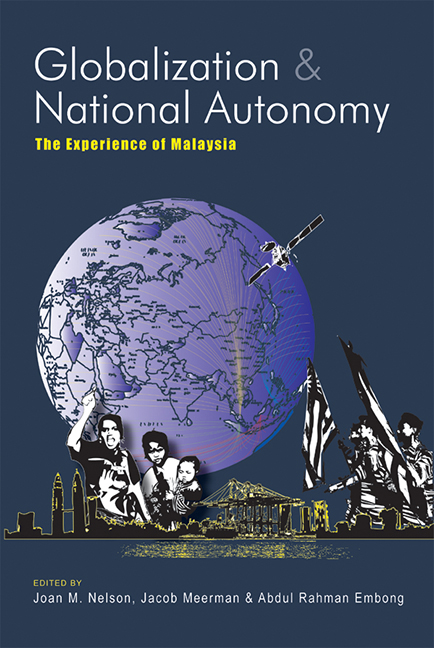Book contents
- Frontmatter
- Contents
- List of Abbreviations
- List of Tables and Figures
- Preface
- Contributors
- Chapter 1 Introduction
- Chapter 2 Developmentalist State in Malaysia: Its Origins, Nature, and Contemporary Transformation
- Chapter 3 The Look East Policy, the Asian Crisis, and State Autonomy
- Chapter 4 The Malaysian Success Story, the Public Sector, and Inter-ethnic Inequality
- Chapter 5 Poverty Eradication, Development, and Policy Space in Malaysia
- Chapter 6 Trade Liberalization and National Autonomy: Malaysia's Experience at the Multilateral and Bilateral Levels
- Chapter 7 Malaysia's Education Policies: Balancing Multiple Goals and Global Pressures
- Chapter 8 Malaysia's Healthcare Sector: Shifting Roles for Public and Private Provision
- Chapter 9 Globalization, Islamic Resurgence, and State Autonomy: The Response of the Malaysian State to ‘Islamic Globalization’
- Chapter 10 The National Culture Policy and Contestation over Malaysian Identity
- Chapter 11 Conclusions
- Index
Chapter 10 - The National Culture Policy and Contestation over Malaysian Identity
Published online by Cambridge University Press: 21 October 2015
- Frontmatter
- Contents
- List of Abbreviations
- List of Tables and Figures
- Preface
- Contributors
- Chapter 1 Introduction
- Chapter 2 Developmentalist State in Malaysia: Its Origins, Nature, and Contemporary Transformation
- Chapter 3 The Look East Policy, the Asian Crisis, and State Autonomy
- Chapter 4 The Malaysian Success Story, the Public Sector, and Inter-ethnic Inequality
- Chapter 5 Poverty Eradication, Development, and Policy Space in Malaysia
- Chapter 6 Trade Liberalization and National Autonomy: Malaysia's Experience at the Multilateral and Bilateral Levels
- Chapter 7 Malaysia's Education Policies: Balancing Multiple Goals and Global Pressures
- Chapter 8 Malaysia's Healthcare Sector: Shifting Roles for Public and Private Provision
- Chapter 9 Globalization, Islamic Resurgence, and State Autonomy: The Response of the Malaysian State to ‘Islamic Globalization’
- Chapter 10 The National Culture Policy and Contestation over Malaysian Identity
- Chapter 11 Conclusions
- Index
Summary
INTRODUCTION
This chapter turns to the National Culture Policy which is little remembered today outside of circles involved in cultural production in Malaysia, especially the arts community. A survey of relevant and significant publications of the past several decades shows no mention at all of the policy (Vorys 1976, Nagata 1979, Andaya and Andaya 1982, Crouch 1996, Hooker 2003, Abdul Rahman 2006). Laws passed in the areas of language and education as well as the Rukunegara [National Credo] are typically raised in discussions of culture in Malaysia but not the National Culture Policy (henceforth NCP). One of the reasons for the relative neglect of the NCP is that it was not enacted and therefore did not have the force of law. Rather, it was formulated and gained power largely due to the efforts of an exclusionary Malay cultural leadership. In addition, the NCP's influence did not last beyond the 1980s when it met with strong social protest as well as the intensification of globalizing policies. Furthermore, the NCP has been overshadowed by the formulation and implementation of the New Economic Policy (NEP). As a consequence, the cultural restructuring attempted in the 1970s has not drawn as much attention as the social and economic reorientation. The framework of the NCP remains in place but its force is much diminished today.
Why study a policy that has apparently had such a lacklustre history? The NCP was, in the 1970s and 1980s, a site of contestation over vital questions such as the culture and identity of the country. Although initiated by the government as one of the measures to encourage national unity following the racialized political crisis of 1969, the NCP became the source of a great deal of contention. Bodies representing the respective cultural interests of different ethnic groups claimed that the policy equated national culture with Malay culture to the exclusion of others. Meanwhile, the exclusionary Malay cultural leadership felt that the NCP provided an opportunity to address the historical marginalization of the Malay language and culture in the colonial era. Lloyd Fernando, then Professor of English at the University of Malaya, made the telling observation in 1969 that Malaysians who were not Malay, with a few exceptions, could speak only a smattering of Malay purely for utilitarian purposes (Fernando 1986, p. 86).
- Type
- Chapter
- Information
- Globalization and National AutonomyThe Experience of Malaysia, pp. 273 - 300Publisher: ISEAS–Yusof Ishak InstitutePrint publication year: 2008

